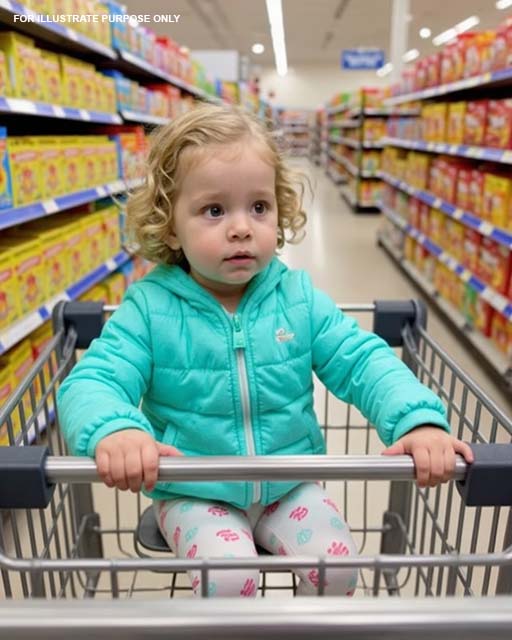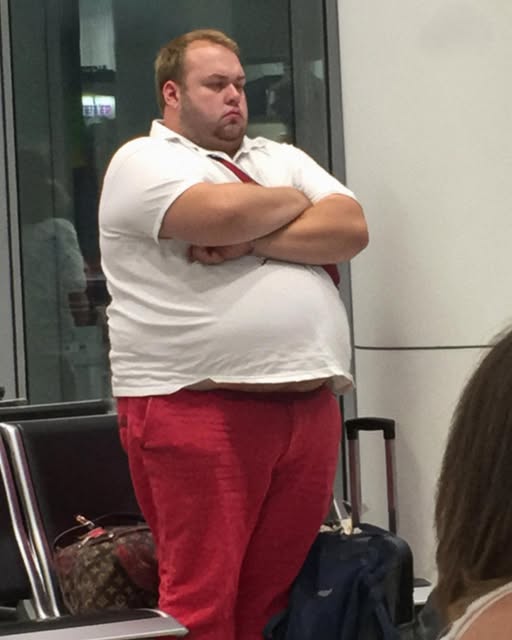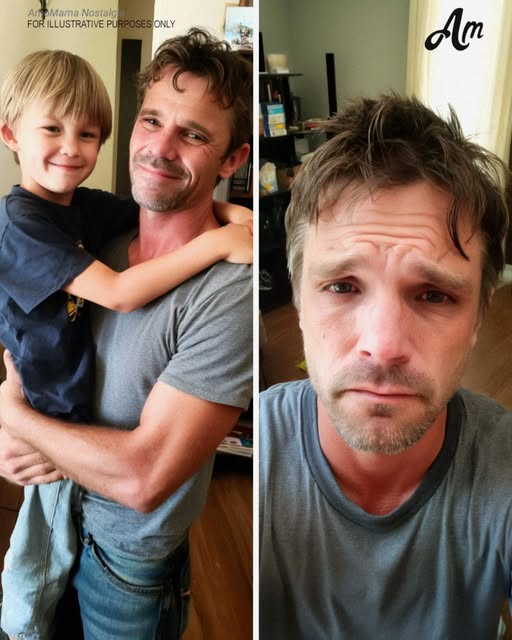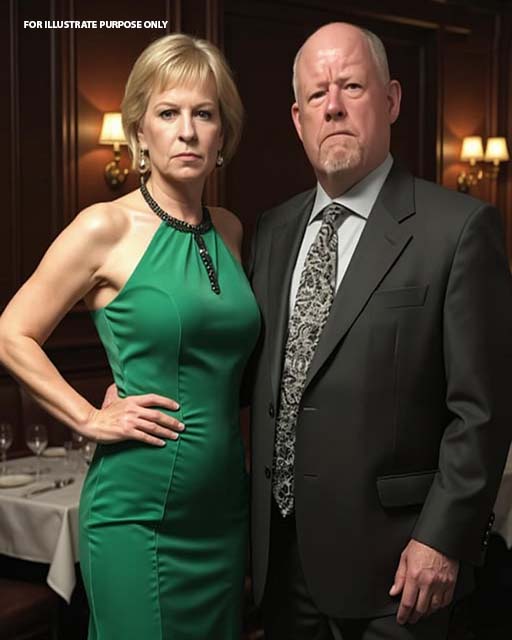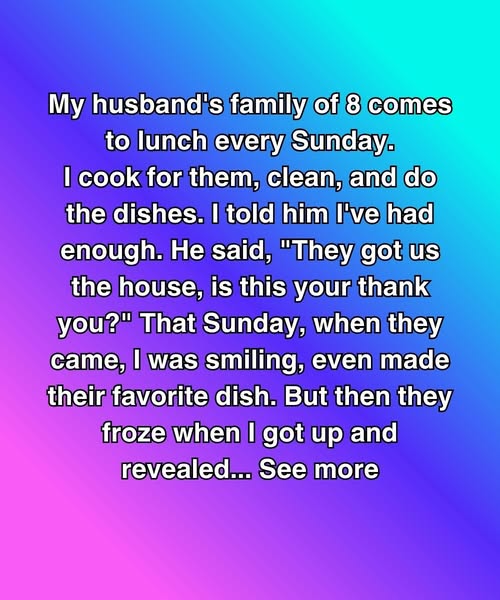The grocery store was my safe place. That might sound ridiculous, but it was true. The hum of fluorescent lights, the faint crackle of the overhead speakers playing soft 80s music, the rattle of cart wheels against linoleum—it was predictable. Predictability was something I craved.
I was halfway down the cereal aisle that day, my cart half-filled with produce and the exact brand of oat milk I always bought, when I froze.
There, tucked neatly into the seat of my cart as if she’d been there all along, sat a little girl.
She couldn’t have been more than six. A pale pink dress, a smudge of dirt on one knee, brown hair curling just past her shoulders. Her legs were folded under her, not dangling through the leg-holes like kids usually sat. She looked small. Almost too small for the space she was in.
And her eyes—wide, liquid brown, brimming with a kind of fear that made my stomach turn—locked onto mine.
My breath caught in my throat.
I hadn’t seen her climb in. I hadn’t even looked away that long—just long enough to compare sugar content between brands.
“Uh… hello,” I managed. My voice sounded wrong, higher than usual.
The girl didn’t flinch. She just pressed her tiny fingers tighter around the cart’s metal edge and whispered, barely audible over the buzz of the overhead lights.
“Don’t give me back. I’m scared.”
The words hit me harder than any shove could.
I glanced wildly around the aisle. A mother searching the shelves? A father calling for his daughter? Nothing. Just a few shoppers pushing carts, minding their own business. No one looked frantic. No one looked like they’d misplaced a child.
“What’s your name, sweetheart?” I crouched a little closer.
Her lips trembled. “Anna.”
I swallowed, my throat suddenly dry.
My mind did the math. A lost child. No parent in sight. A grocery store filled with strangers. This wasn’t supposed to happen to me. This wasn’t supposed to happen here.
“We should find the manager,” I said, but my voice faltered when her eyes welled up.
“Don’t give me back,” she whispered again, a little louder this time.
The plea rooted itself inside me.
For the next twenty minutes, I tried to reason. I wheeled her up and down the aisles, scanning faces, waiting for someone to shout her name. But no one did.
I hovered over my phone, thumb trembling above the numbers, ready to call the police. And then she tugged my sleeve. Her hand was so small it barely dented the fabric.
Her eyes glistened. “Please. I’m scared.”
Something inside me snapped. Or maybe it softened. Whatever it was, it silenced the voice of reason. I didn’t call the police. I wheeled her out of the store, past the clerk who didn’t even glance twice, loaded my bags into the trunk, lifted her into the back seat, and drove.
My heart hammered the whole way home.
At the kitchen table, I made her a sandwich. She nibbled cautiously, eyes darting to me after every bite like she was waiting for the food to be taken away. The house, usually so quiet, felt alive with her presence—fragile, uncertain, but alive.
The front door creaked open. My sister Claire.
She stopped cold in the doorway, staring at Anna. Her eyebrows shot up.
“What is this?”
I took a breath. “This is Anna. I found her at the grocery store.”
“You… found her?” Claire’s tone was sharp, incredulous.
“She was alone.” My words tumbled out too fast. “No one was looking for her. What was I supposed to do—leave her there?”
“Yes! Or call the store manager, or the police!” Claire pinched the bridge of her nose. “You can’t just bring home a child, Elena. This is insane.”
I bristled. “She was terrified.”
Claire shook her head. “You’re going to get us both in trouble.”
I tried to sound calmer than I felt. “I called Adam. He’ll know what to do.”
Claire huffed and retreated to her room, muttering something about disasters waiting to happen.
That night, I tucked Anna onto the couch with a blanket. She curled into herself like a kitten, gripping the fabric tight. I sat in the armchair, watching her chest rise and fall, wondering how long it had been since she’d felt safe enough to sleep.
The knock on the door came the next morning.
Two social workers stood there, their smiles polite but firm.
“We’re here for Anna,” one said gently.
My stomach sank.
Anna’s hands clutched the table edge, knuckles white.
“Sweetheart,” I knelt beside her. “They’re here to help. You have to go with them for now.”
Her eyes filled with panic. Her voice broke.
“Please. Don’t give me back. I’m scared.”
It felt like betrayal, handing her over. Her fingers slipped from mine, and the door closed behind her. The silence after nearly crushed me.
Minutes later, Adam called. His voice was grave.
“She really is Anna. She’s run away before. No abuse proven, but… her father died, and the home’s unstable.”
My jaw tightened. “Do you have an address?”
“Yes. Sending it now.”
When I turned, Claire stood in the living room, arms crossed.
“You see? This is why I called them. You always think you can fix everyone.”
I snapped. “Fix everyone? That little girl was terrified. She didn’t need fixing—she needed someone to care.”
Claire’s lips pressed tight. For once, she had no comeback.
I drove to the address.
The house sagged under its own weight. Paint peeled in long strips. Weeds crawled up the porch. When the door opened, the woman standing there looked as worn as the house itself.
“Margaret?” I asked softly.
She nodded.
“I was with your daughter,” I said. “Anna.”
At her name, Margaret’s face crumpled. Tears spilled as she motioned me inside.
The living room was bare except for stacks of unopened mail and half-empty bottles. She collapsed onto the couch.
“I can’t take care of her,” she whispered. “Not anymore.”
I sat beside her. “You love her. I can see that. But she needs more than you can give her right now.”
Margaret’s shoulders shook. “After my husband died… everything fell apart. I fell apart.”
My heart ached. “You don’t have to do this alone. Let me help. Anna can stay with me until you’re ready. But you have to promise to work on yourself.”
She searched my face, desperate and hollow. “You’d really do that?”
“Yes.” My voice was steady. “For her.”
When social services returned, Anna ran straight to her mother.
“Mommy!” she cried.
Margaret fell to her knees, clutching her daughter. “I’m here, baby. I’m here.”
Through tears, she looked up at me. “Thank you.”
We reached an agreement: Anna would stay with me temporarily. Margaret would get support. Someday, when she was strong again, they’d reunite.
That night, as I tucked Anna into bed, she whispered, “Will I see Mom again?”
“Yes, sweetheart. When she’s ready. Until then, you’re safe here.”
Her small body finally relaxed. She fell asleep without fear gripping her hands.
I stood in the doorway, watching her breathe. And I realized:
Sometimes love isn’t about clinging tight. It’s about creating space—space for healing, space for hope.
Anna had walked into my life by accident. Or maybe not. Maybe fate.
Either way, she’d rewritten everything I thought I knew about family.
